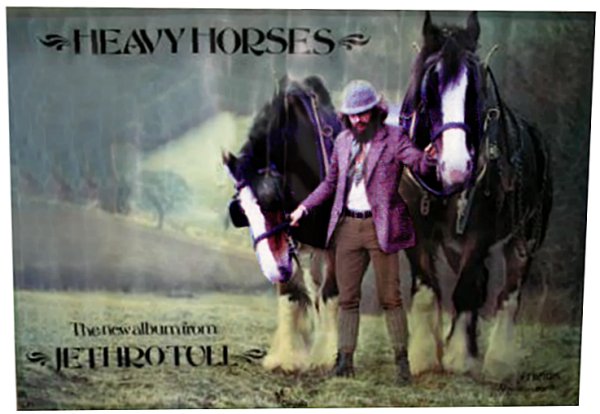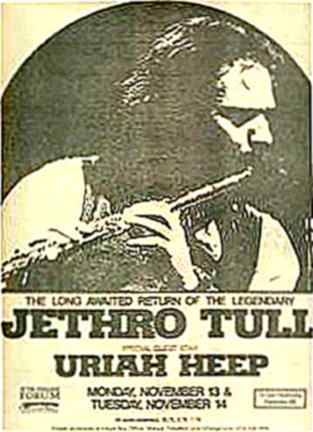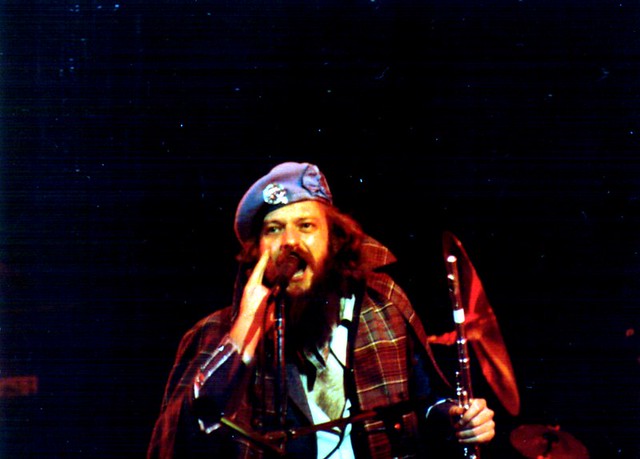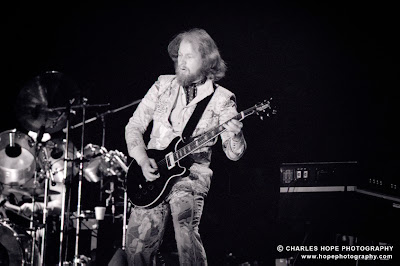Post by Mark Lavallee on Sept 11, 2012 15:12:06 GMT -5
Next we have the very logical successor to the wonderful Songs From The Wood album, 1978's equally as wonderful, if considrably
darker, Heavy Horses.

Released on April 10th in the US where it peaked at #19 and April 21st in the UK where it peaked one step lower at a respectable
#20.

This album would, unfortunately, be the last to feature bassist John Glascock playing on all the tracks, he passed away in 1979 as
the result of a genetic heart valve defect.

This album is considered the middle of Tull's "folk trilogy" along with the aforementioned Songs From The Wood and the followup
Stormwatch. The rural element is still quite strong but it's far less romantic, a much darker, more realist view lyrically.

Side A opens with the brilliant, heavy rocker ...And The Mouse Police Never Sleeps. Anderson is a cat lover and the song is a
tribute to them and their nightly vigilance in catching mice. A reminder that death and killing are a part of nature. A great
short rocker and a brilliant way to start the album on an upbeat note.

Up next is another rocker, with a healthy blend of the medieval feel of the prior album and a dare-I-say-it, almost discoish
rhythm! A seemingly simple song about sex, a little bit of thought realizes the true intent, comparing the beauty of nature
(Ian's native Scotland to be precise) and the dreary landscapes of modern city life.

Next up we have the wonderful mini-epic No Lullaby which features (no debate!) the greatest drum fill in all of music history
courtesy of the great Barriemore Barlow. (1:13 - 1:20 mark on the video below) A dark, heavy rocker with a great guitar intro
courtesy of Martin Barre, and all around incomparable playing from all involved. The song builds and builds in intensity,
lyrically the song is a very dark fairy tale, a word of warning to the listener of the, at the time, growing trend of fascism in
many European countries in the mid/late 70s.
Next up we have the beautiful acoustic number Moths, the single from the album which unfortunately went nowhere. It's a beautiful
song with a very beautiful lyric about making love by candlelight with moths fluttering about it.
The side concludes with the midtempo Journeyman. A song with a nice bluesy groove, great bass and crunchy guitar. A song about
businessmen taking trains throughout the country.

Side A opened with an ode to cats so naturally side B opens with an ode to dogs, the aptly titled Rover, about a free wandering
canine. The folk element is strong here with a nice acoustic 12 string filing in the gaps between the heavier rock element of the
tune.

Up next is the big favorite One Brown Mouse, a short folky number with Tull's unique blend of unique instrumentation and
hodgepodge of influences combine to perfection. An ode to a mouse in a cage with a little bit of pondering on the routine nature
of life "Which one of us exercises on the old treadmill." A beautiful uplifting gem of a song.
Next we have the epic title track, a Tull setlist mainstay to this day, and for good reason. A eulogy for the working horses of
Great Britain which find themselves no longer needed due to modern machinery. What to say about this perfect song? The beautiful
guitar intro courtesy of Martin Barre, the incredibly catchy chorus, the variety of moods throughout, the amazing orchestration
courtesy of David Palmer, the perfect rhythm section of Barlow and Glascock. This song does it all and does it to perfection.
The album concludes with Weathercock, a prelude to the next album Stormwatch, using weather as an anallogy for the state of
humanity. A slower tune to close us out with song nice mandolin and some nice understated organ from John Evan.

The remaster of the album comes with two wonderful bonus tracks. First up is Living In These Hard Times, why it wasn't included
on the album is beyond me, I'd have replaced either Journeyman or Rover with it. Lyrically it'd fit more on Broadsword And The
Beast. A really great, catchy song.
And finally we have Broadford Bazaar, a song about the small town on the isle of Skye which has a ferry terminal and is a chaotic
spot with tourists, old roads not designed for the traffic and hence the image of a bustling middle eastern bazaar. How this
didn't make the cut is beyond me, it's the best vocal on the album. An incredible song, sometimes I don't know what the artist is
thinking when they decide to track their albums.
Final thoughts:
The natural sequel to Songs From The Wood which at times reaches even higher peaks. Though a few tracks could be deemed filler. A much darker album than SFTW, nothing overbearing, there's still plenty of Anderson's playfulness. Another essential album in the Tull catalog.
Final rating 4.75 out of 5 stars.
darker, Heavy Horses.

Released on April 10th in the US where it peaked at #19 and April 21st in the UK where it peaked one step lower at a respectable
#20.

This album would, unfortunately, be the last to feature bassist John Glascock playing on all the tracks, he passed away in 1979 as
the result of a genetic heart valve defect.

This album is considered the middle of Tull's "folk trilogy" along with the aforementioned Songs From The Wood and the followup
Stormwatch. The rural element is still quite strong but it's far less romantic, a much darker, more realist view lyrically.

Side A opens with the brilliant, heavy rocker ...And The Mouse Police Never Sleeps. Anderson is a cat lover and the song is a
tribute to them and their nightly vigilance in catching mice. A reminder that death and killing are a part of nature. A great
short rocker and a brilliant way to start the album on an upbeat note.

Up next is another rocker, with a healthy blend of the medieval feel of the prior album and a dare-I-say-it, almost discoish
rhythm! A seemingly simple song about sex, a little bit of thought realizes the true intent, comparing the beauty of nature
(Ian's native Scotland to be precise) and the dreary landscapes of modern city life.

Next up we have the wonderful mini-epic No Lullaby which features (no debate!) the greatest drum fill in all of music history
courtesy of the great Barriemore Barlow. (1:13 - 1:20 mark on the video below) A dark, heavy rocker with a great guitar intro
courtesy of Martin Barre, and all around incomparable playing from all involved. The song builds and builds in intensity,
lyrically the song is a very dark fairy tale, a word of warning to the listener of the, at the time, growing trend of fascism in
many European countries in the mid/late 70s.
Next up we have the beautiful acoustic number Moths, the single from the album which unfortunately went nowhere. It's a beautiful
song with a very beautiful lyric about making love by candlelight with moths fluttering about it.
The side concludes with the midtempo Journeyman. A song with a nice bluesy groove, great bass and crunchy guitar. A song about
businessmen taking trains throughout the country.

Side A opened with an ode to cats so naturally side B opens with an ode to dogs, the aptly titled Rover, about a free wandering
canine. The folk element is strong here with a nice acoustic 12 string filing in the gaps between the heavier rock element of the
tune.

Up next is the big favorite One Brown Mouse, a short folky number with Tull's unique blend of unique instrumentation and
hodgepodge of influences combine to perfection. An ode to a mouse in a cage with a little bit of pondering on the routine nature
of life "Which one of us exercises on the old treadmill." A beautiful uplifting gem of a song.
Next we have the epic title track, a Tull setlist mainstay to this day, and for good reason. A eulogy for the working horses of
Great Britain which find themselves no longer needed due to modern machinery. What to say about this perfect song? The beautiful
guitar intro courtesy of Martin Barre, the incredibly catchy chorus, the variety of moods throughout, the amazing orchestration
courtesy of David Palmer, the perfect rhythm section of Barlow and Glascock. This song does it all and does it to perfection.
The album concludes with Weathercock, a prelude to the next album Stormwatch, using weather as an anallogy for the state of
humanity. A slower tune to close us out with song nice mandolin and some nice understated organ from John Evan.

The remaster of the album comes with two wonderful bonus tracks. First up is Living In These Hard Times, why it wasn't included
on the album is beyond me, I'd have replaced either Journeyman or Rover with it. Lyrically it'd fit more on Broadsword And The
Beast. A really great, catchy song.
And finally we have Broadford Bazaar, a song about the small town on the isle of Skye which has a ferry terminal and is a chaotic
spot with tourists, old roads not designed for the traffic and hence the image of a bustling middle eastern bazaar. How this
didn't make the cut is beyond me, it's the best vocal on the album. An incredible song, sometimes I don't know what the artist is
thinking when they decide to track their albums.
Final thoughts:
The natural sequel to Songs From The Wood which at times reaches even higher peaks. Though a few tracks could be deemed filler. A much darker album than SFTW, nothing overbearing, there's still plenty of Anderson's playfulness. Another essential album in the Tull catalog.
Final rating 4.75 out of 5 stars.


